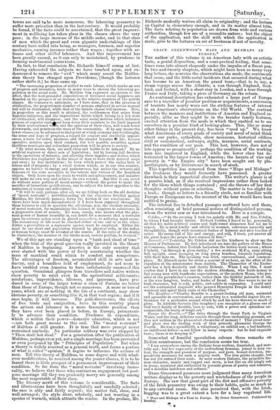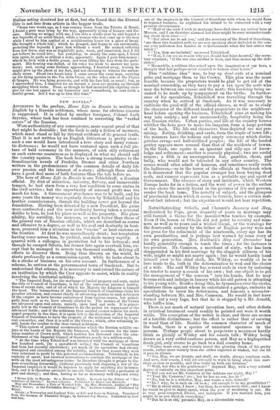GRACE GREENWOOD'S HAPS AND MISHAPS IN EUROPE. * THE author' of
this volume is an American lady with an artistic taste, a genial disposition, and a semi-poetical feeling, that some- times runs into almost rhapsody under the impulse of a fluent pen. In two-and-twenty chapters, which might have been so many very long letters, she narrates the observations she made, the sentiments. that arose, and the little social incidents that occurred during what has become to an American the grand tour,—that is to say, a, steam voyage across the Atlantic, a run through England, Scot-. land, and Ireland, with a short stay in London, and a tour through France and Italy, taking a piece of Germany on the return.
As continual description has exhausted a large part of Europe save to a traveller of peculiar position or acquirements, a succession of tourists has nearly worn out the striking features of interest in an American's observations on the Old World. The contrast between the manners and institutions of America and England es pecially, alike as they might be in the broader family features, excited attention from the mode in which they enabled us to see ourselves in a peculiar kind of looking-glass. This, like so many other things in the present day, has been "used up." We know what Americans of every grade of society and mood of mind think about our parks, cathedrals, show mansions, historical edifices civil or ecclesiastical, railways, sights, manners, social contrasts, and the condition of our poor. This last, however, does not of late appear so prominently : perhaps the condition of the working man has improved in England, while the lower class has de- teriorated in the larger towns of America; the haunts of vice and poverty in " the Empire city" have been sought out by phi- lanthropists, or by litterateurs in search of stock.
This repetition has removed from these "Raps and Mishaps". the freshness they would formerly have possessed. A greater drawback is their superficial character. The writer's glance is of a passive kind, as if she received impressions rather than looked for the ideas which things contained ; and she throws off her first thoughts without pains or selection. The matter is too slight for a book ; though as letters to a friendly circle, not so familiar with Europe as Europeans are, the account of the tour would have been entitled to praise.
The interest lies in detached passages scattered here and there, often consisting of brief personal notices of distinguished persons, whom the writer saw or was introduced to. Here is a sample.
Cobden. —" In the evening I took tea quietly with Mr. and Mrs. Cobden, to whom I had brought letters. Richard Cobden I found to be, personally, all that his noble political course and high-toned eloquence had led me to expect. He is most kindly and affable in manner, converses earnestly and thoughtfully, though with occasional flashes of humour and nice touches of satire. He seems full of life and energy, and will, I trust, yet answer all the great hopes the people have reposed in him." Disraeli.—"Yesterday Mr. Cobden did me the kindness to show me the Houses of Parliament. He first introduced me into the gallery of the House of Commons, behind that Turkish barbarism the lattice-work screen ; where I beheld, as through at glass darkly,' a few scattered M.P.s, some sitting bolt upright, some lounging on long green benches, leisurely legislating, with their hats on. The speaking was brief, conversational, and common- place. Mr. Disraeli spoke for about a quarter of an hour, on the affair of the expulsion of the missionaries from Austria. The Chancellor of the Exche- quer has a look decidedly and darkly Hebraic. When I say this, I must confess that I have in my eye the modern Abraham, who lends money to fast young men with handsome expectations, or the modern Moses, who pre- sides at the pawnbroker's counter, rather than the faithful patriarch of old, or the wise lawgiver, leader, and feeder of Israel. The face wears to me no high character, but is cold, politic, and subtle in expression. I could only see the sentimental exquisite who penned Henrietta Temple in the dainty waistcoat and spiral black curls of the Chancellor." The Kembles.—" Charles Kemble is a grand-looking old man, animated and agreeable in conversation, and preserving to a wonderful degree his en- thusiasm for a profession around which be and his have thrown so much of glory. In Adelaide Sartoris [his daughter] you recognize at a glance one of that royal family of Kemble, born to rule, with a power and splendour un- surpassable, the realm of tragic art." George the Fourth.—" The drive through the Great Park to Virginia Water, and the long, delicious ramble through those enchanting grounds, are they not written in the pleasantest chronicles of memory ? This sweet sum- mer place was the darling work of that princely pleasurist George the Fourth. He was a spendthrift, a voluptuary, an unfilial son, a bad husband, an indifferent father—a sad fellow in many respects : but he had exquisite taste; there is no denying it."
Somewhat of fanciful speculation colonic; these remarks on Italian countenance, but the conclusion seems too true.
"I see everywhere among the Italians faces restless, dissatisfied, and mor- tally sad ; but few expressive of the unflinching firmness, joined to fiery va- lour, the strength and grandeur of purpose, and pure, honest devotion, im- peratively necessary for such a mighty work. The iron pricks sharply, but has not yet entered their souls. In most modern Italians, the primitive Ro- man character, manly and rugged and stern, is but like an old kingly oak in decay, decorated and enthralled by parasite graces of poetry and romance, and a mosslike indolence and softness.
Grace Greenwood possesses more judgment than many American writers display as to the poverty and wretchedness of the people in Europe. She saw that great part of the dirt and offensive poverty of the Irish peasantry was owing to their habits, quite as much as to any external cause. She also perceived that, with the Irish, begging was to a great extent a love for a lazy vagabond life.
Haps and Mishaps of a Tour in Europe. By Grace Greenwood. Published by Bentley.
Italian acting deceived her at first, but she found that the Eternal City is not free from artists in the beggar trade. "Some two weeks ago, as I was coming down from the Trinita di Monti, I. found a poor man lying by the way, apparently dying of hunger and dis- ease. Having no mosey with me, I ran into a studio near by and begged a few bajocchi of an artist friend, while a woman who had come up to the man while I stood by him applied at a neighbouring house for a piece of bread. She brought a whole loaf ; which he grasped, and began to eat ravenously, pocketing the bajoechi I gave him without a word. He seemed suffering from low fever, and was so frightfully pale, weak, and emaciated, that I did not believe he could live ; but yesterday, in nearly the same spot, I found him again, in quite as critical a state, apparently. Again I gave him money ; which he took with a feeble groan, not even lifting his face from the pave- ment. His hearing was dulled, or his voice too weak to answer my ques- tions ; and, seeing some Italians approaching, I hurried away, fearing he might give up the ghost at my feet, and not choosing to witness the melan- choly scene. About two hours later I came across the same man, carrying on his dying agonies in the Via della Croce, on the other side of the Piazza di Spagna. He was lying prostrate, and with his face hid, as usual ; but, as I approached him, I observed for an instant a keen eye peering up through straggling black locks. Then, as though he had mustered his expiring ener- gies for one last appeal to my humanity and womanhood, he sent forth a fearful groan. But I was up to him this time."



































 Previous page
Previous page